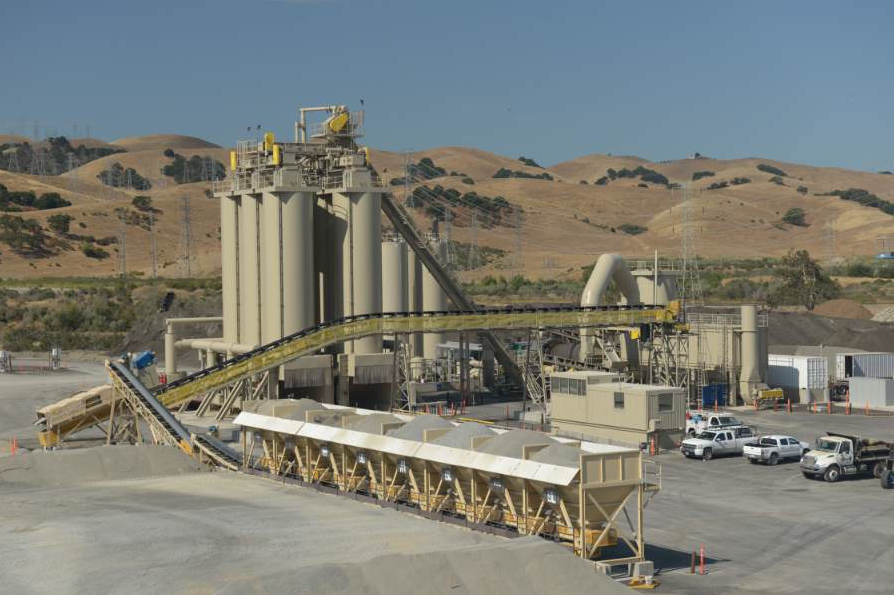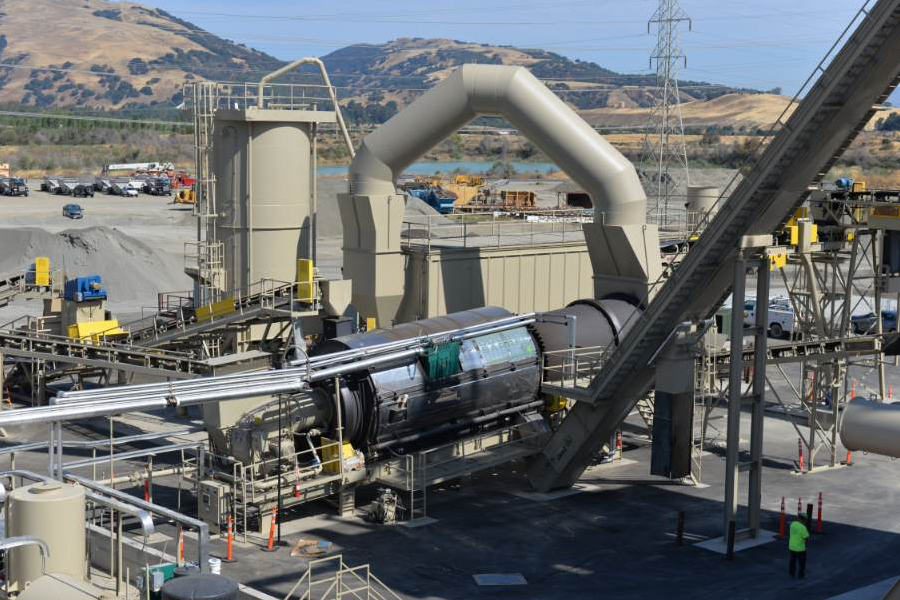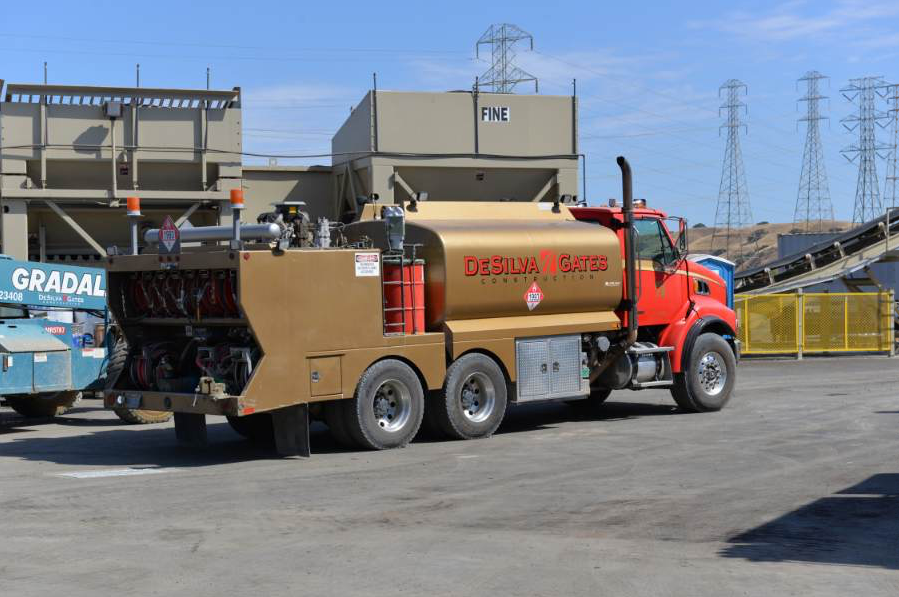DeSilva Gates Aggregates Meets Air, Seismic Standards
BY Astec, Inc.

In addition to sunshine, surf and oranges, California is known for having the largest, tallest, and oldest trees in the United States—the sequoia sempervirens and the sequoiadendron giganteum. The state also has some of the most stringent air quality standards in the nation. Doing business in California requires patience and careful planning to complete the environmental impact process and acquire the correct air quality permits for asphalt plant operations.
The management team for DeSilva Gates Construction, Dublin, California, knows this process firsthand.

DeSilva Gates purchased a Double Barrel® drum of 9 feet by 47 feet, capable of producing mixes with up to 50 percent RAP and equipped with the Astec V-flights.
Family Grows In the Redwood State
According to the DeSilva Gates website, Edwin O. DeSilva and Richard B. Gates currently lead the company’s management team with support by a team of personnel specializing in grading, paving and construction management. The company itself specializes in heavy, highway and civil engineering construction for both public and private clients. While the company started out as a small grading and paving company when Oliver de Silva founded it in 1932, it has grown into a workforce of more than 1,000 employees with combined annual revenues in excess of $350 million. That workforce operates and maintains a serious fleet of equipment comprising more than 350 pieces of heavy equipment, not limited to:
• 50 motor graders
• 45 compactors
• 60 dozers
• 20 loaders
• 36 excavators
• 95 scrapers
• 8 asphalt pavers
• 40 rollers
To keep the equipment in tip-top shape, the fleet is serviced and maintained by three maintenance facilities that employ more than 30 mechanics. Through its division—DeSilva Gates Aggregates—the company owns and operates quarries and asphalt plants annually producing over 2 million tons of aggregates and processed fill, and over 1 million tons of asphalt mix, as reported on the website.
Additionally, the company provides in-house environmental remediation services through its affiliate Pacific States Environmental Contractors, Inc.
In early 2015, DeSilva Gates completed installation of its first Astec asphalt plant at its Sunol, California, location. According to Alan French, general manager of DeSilva Gates Aggregates, the company looked to Astec to provide the latest technologies to meet the requirements for an asphalt plant in the State of California and Alameda County.
“The Sunol asphalt plant was three-plus years in the making. We aligned ourselves with Astec,” French said. “We are now positioned to move forward and provide asphalt, in addition to aggregates, from this location, supporting our customers and construction division in and around the area.”

DeSilva Gates Construction has three maintenance facilities with more than 30 employees keeping the 350 pieces of machinery in tip-top shape.
Bring New Tech To the Table
DeSilva Gates installed a 500 TPH (454 MTPH), 9-foot by 47-foot (2.74-m by 14.33-m) Astec Double Barrel® plant. The Double Barrel-v drum mixer is designed to produce quality mixes while keeping the operating costs per ton of mix low. Its design meets the stringent environmental codes of California. The entire drum is used for production of mixes with up to 50 percent reclaimed asphalt pavement (RAP).
The California Department of Transportation (Caltrans) determines the amount of RAP that can be used in various mixes for projects around the state. For DeSilva Gates, having the ability to use a high percentage of RAP prepares the company for future changes to Caltrans’ mix specs.
“We are running up to 40 percent RAP in our mixes per Caltrans specs,” French said.
DeSilva Gates’ newest asphalt plant is equipped with Astec’s warm mix system, which uses a multi-nozzle manifold to produce a foamed WMA that is odorless and smokeless.
Another Astec technology incorporated into the DeSilva Gates’ plant is the patented V-Pack™ Stack Temperature Control System.
This system allows the operator to set an optimum stack temperature for a particular mix. For example, the V-Pack lowers the stack temperature on high-RAP mixes, open-graded mixes and stone-matrix asphalt (SMA); the stack temperature is raised on virgin mixes and low-RAP mixes. The V-Pack makes it possible to run SMA and high-RAP mixes back-to-back with virgin mixes without flight adjustments.
The V-Pack system has “V-flights,” which are unique drum flights with a deep v-shape, and variable frequency drives (VFDs), which provide control of the drum rotational speed. V-flights are designed to create uniformity of the aggregate veil during the drying process, which results in better heat transfer, a reduction of fuel use, increased productivity and longer bag life.
“Our Sunol location has the most state-of-the-art asphalt plant compared to any place, not just in California, due to the air quality standards we’ve had to meet,” French shared. “We also had to meet the local seismic design requirements as directed by the building code in Alameda County.”
The International Code Council (ICC) has a complex system for determining what Seismic Design Category (SDC) classification should be assigned to a structure based on its occupancy or use. The classification takes into account “the level of expected soil modified seismic ground motion” and seismic vulnerability. As readers will understand, California has a high seismic vulnerability. Structures there, including asphalt plants and tank farms, have to pass muster with code enforcement. In fact, the 2013 California Title 24 codes became mandatory Jan. 1, 2014, and they affect everything from residential to green building standards.
French continued: “Our Sunol facility has been working day and night since about May or June and we’ve currently run more than 100,000 tons (110,231 tonnes) through the plant. The plant is still new, and after a few more months of operating, we’ll feel more comfortable with the Astec plant and its state-of-the-art technologies. We’re working up to running 500 TPH (454 MTPH) and we’ll get there soon. Right now, the Sunol plant is permitted for 1,000,000 tons of asphalt per year.”
